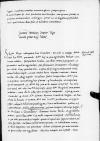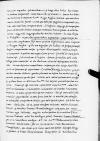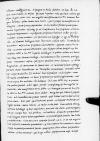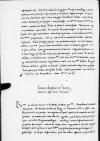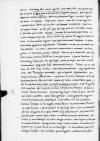Paulo ante per binas postas – et per ea<m>, quae in ⌊Flandriam⌋, et illam, quae ad ⌊Urbem⌋ hinc mittebatur – haec, quae in hac temporis angustia potui, Maiestati Vestrae Serenissimae descripsi, quomodo ⌊huc⌋ 1524-09-19⌊XIX Septembris1524-09-19⌋ applicui, et quam diu hospitium neque colloquium, quod audientiam vocant, a ⌊maiestate caesarea⌋ habere potui, et qualiter omnia hic infecta offenderim, sic etiam, quod ⌊magnus cancellarius⌋ has tres quadragenas sobellorum sine maiestatis caesareae consensu nequaquam nomine Maiestatis Vestrae Serenissimae accipere voluit. Data tandem a me est opera, modis quibus potui omnibus, pro audientia hac habenda. Quae habuit multos obices, in primis ⌊caesareae maiestatis⌋ aegritudinem quartanam, quae ita morosam et taediosam illius maiestatem reddebat, quod etiam propriis negotiis (et non parum urgentibus) omissis se in locum solitarium contulit, ad Cartusienses, tribus abhinc miliaribus et deinde ulterius ad ⌊matrem⌋ in ⌊Tordesillis⌋, ubi etiam audientiae meae tractatus matrimonii inter ⌊Catherinam⌋ sororem iuniorem illius maiestatis et ⌊regem Portugaliae⌋ impedimento fuit.
Post longam demum sollicitationem meam in colloquium illius maiestatis 1524-10-10⌊X Octobris1524-10-10⌋ sum admissus, quod sic se habuit: dominus ⌊magnus cancellarius⌋, ad ⌊Tordesillas⌋ vocatus ⌊hinc⌋ a ⌊maiestate caesarea⌋, concesserat ob hanc, ut intellexi, audientiam. ⌊Quo⌋ cum pervenisset, ⌊⌋ mihi, ut ex inclusa copia ostenditur, quod ⌊maiestas caesarea⌋ gratum haberet adventum meum, quem hactenus ignorasset (si credere dignum est, cum toties comitem de Nassau, ipsum etiam magnum cancellarium atque alios officiales de habendo hospitio et per litteras et per nuntios meos hortatus fuissem). Perveni tandem, quemadmodum ⌊cancellarius⌋ in litteris suis voluit, pro 1524-10-11⌊tempore praefixo1524-10-11⌋ ad ⌊Tordesillas⌋ et illic ante portam nepotem domini cancellarii cum aliis quibusdam equitibus inveni, qui me exceperunt et ad diversorium cancellarii perduxerunt. Cumque cum illo per decursum fere unius horae consedissem et nun{c}tios aliquoties ad ⌊caesarem⌋, quando venire deberemus, misisset, data nobis fuit adeundi facultas. Et postquam foribus, ubi erat ⌊caesar⌋, appropinquabamus, misit ad me illius maiestas bis, antequam fuissemus intromissi, ut ea, quae per me nomine Serenissimae Maiestatis Vestrae essent dicenda, in compendium redigerem, nam illius maiestas propter medicinas acceptas diu occupari non posset. Hoc etiam cancellarius me rogabat aliquoties. Data desuper fide introivi. Vidi ⌊caesarem⌋ stantem, pallidum, macerrimum, ut vix a me dinosci poterat. Statim me viso manum extendit. Deinde, postquam illius maiestatem nomine Maiestatis Vestrae Serenissimae salutassem, exhibui illi creditivas addens, si commissa mea audire posset, me illa, quanto brevius daretur, relaturum. ⌊Maiestas illius⌋ rogabat, ut cum ⌊magno cancellario⌋ omnia conferrem et illi singula exponerem, qui mihi desuper respondere et me tandem absolvere deberet. Germanice postea maiestatem illius allocutus rem totam legationis meae ex compendio illi rettuli et rogavi se in his omnibus, quemadmodum ipsa aequitas et mutua sanguinis necessitudo cum Maiestate Vestra Serenissima exposcit, exhiberet, et quod non crederet delatoribus, qui niterentur fortassis variis suis fabulis, quae passim in aula maiestatis suae feruntur, hunc mutuum amorem atque coniunctionem inficere. Respondit illius maiestas se numquam aliter sensisse de Maiestate Vestra Serenissima, quam de fratre et amico integerrimo et se nullis delationibus moveri, immo se semper Maiestati Vestrae Serenissimae et in his rebus a me expositis bonum fratrem et amicum exhibiturum. Et sic quasi venia petita, „Vorczeit mir” dicens ⌊se⌋ in conclave suum contulit. Non potui certe non condolere huic bono iuveni sic male hac aegritudine affecto.
Inde rursus post prandium a ⌊magno cancellario⌋ in ⌊Valle Oleti⌋ confectis decem miliaribus nostris redii, nam locus ibidem non erat in diversorio. Rediit etiam 1524-10-12⌊die sequenti1524-10-12⌋ ⌊cancellarius⌋, qui ea, quae ⌊maiestati caesareae⌋ exponere debui, in scriptis a me postulavit et accepit et se desuper cum aliis consiliariis ad hoc deputatis consulturum dixit. Paulo post ⌊⌋ ad eum quaerens, si ⌊caesar⌋, ut sobellos acciperet, iam consensisset. Ad quod mihi ⌊⌋, ut in copia inclusa habetur; unde Maiestas Vestra Serenissima, quomodo hic negotia tractantur, intelliget. 1524-10-13⌊Postero die1524-10-13⌋ ⌊illum⌋ accessi hortans, ut pelles illas susciperet, promittens me Germanice cum ⌊caesare⌋ seorsum ea de re loquturum, cum primum admitterer in colloquium. ⌊Ille⌋ vero nequaquam annuere voluit, nisi prius ⌊caesar⌋ illi mandaret, et etiam dixit, si essent plures centum vicibus, quod eas contra iuramentum suum caesari de hoc officio praestito non acceptaret.
Re hoc in cardine stante advenit huc mihi multum desideratus, et de quo etiam in litteris meis ad ⌊urbem⌋ missis memini, dominus doctor ⌊Borg⌋; qui quanto me gaudio suo adventu affecit, neque scribi neque dici potest. Haerebam enim non in parvo rerum gerendarum dubio, praesertim cum de hereditate serenissimae ⌊reginalis maiestatis⌋ nulla mihi certa data fuisset instructio, et hic ego rem aliter se habentem, quam in ⌊Neapoli⌋ fui edoctus, inveneram habitis tot cum ⌊magno cancellario⌋ de sequestro interposito disputationibus, de quo hic primum ab illo habui notitiam, illeque iure interpositum et revocari non posse assereret.
Quibus modis hoc in turbine versatus sum, ut is, qui libenter in rebus commissis bene serviret, Deo notum est. Habet hic continuum suum sollicitatorem dux Mediolani, quendam nomine Camillum, hominem bene industrium et doctum, qui nullam omittit operam, quo sequestrum fixum maneret; fuitque apud me et ad longum est mecum de his rebus collocutus volens quippiam expiscari. Interrogabat etiam, si mandata haberem ad ineundam amicabilem compositionem; qui sibi dignum responsum reportavit.
Illustris dominus dux Calabriae, cum quo nuper fui in prandio apud ⌊magnum cancellarium⌋, non videtur contra ⌊reginalem maiestatem⌋ quicquam duriter sollicitare. Ibidem ad tabulam magna cum diligentia de fe
licitate et prospera valetudine Maiestatis Vestrae Serenissimae et reginalis quaerebat et se obtulit, ut moris est, verbis generalibus. Videtur ista tragoedia de sequestro ex alio fonte manasse, et quod forte non ob aliam causam sit factum, quam ut sub hoc colore castrum haberi possit Barense, de quo timebatur propter legationem factam in Gallias, ne in manus Gallorum traderetur, unde omnes istae difficultates certo habent originem. Si castrum hoc fido castellano fuisset custoditum, hac nunc careremus molestia et cetera.
Dominus doctor ⌊Borg⌋ huc appulit et in hospitium meum, qualibet septimana pro tribus ducatis conductum, divertit 1524-10-15⌊quindecima Octobris1524-10-15⌋ et 1524-10-24⌊XXIIII eiusdem mensis1524-10-24⌋, post sedulam nostram sollicitationem utrimque factam, in ⌊Tordesillis⌋ a ⌊maiestate caesarea⌋ habuit audientiam. Quam ego eo modo et apud ⌊cancellarium⌋ et apud comitem de ⌊Nassau⌋ procurabam, ut sine taedio re et necessitate id exigente a ⌊maiestate caesarea⌋ praestaretur. Quod, cum ⌊illius maiestas⌋ iam habere melius coeperat, impetravimus. Perorabat itaque dominus doctor luculenta oratione ea, quae in mandatis habuit. Ad quae in summa responsum, quod super his rebus etiam per me ante expositis: per consiliarios iam tractaretur, unde brevi expeditionem sperare deberemus. Sic iterum dimissi et cum ⌊cancellario⌋ pransi decem haec miliaria rursus in ⌊Vallem hanc Oleti⌋ confecimus.
Et ne quicquam intemptatum relinqueremus, 1524-10-28⌊XXVIII praedicti mensis1524-10-28⌋, me iterum in ⌊Tordesillis⌋ ad ⌊magnum cancellarium⌋ et comitem de Nassau contuli, a quo petii, ut me seorsum in colloquium admitteret. In quo cum essemus, ad spatium temporis satis longum illi iustitiam et iura serenissimae reginalis maiestatis ab ovo, ut dicunt, exorsus exposui, et quomodo contra omnem iuris ordinem causa indicta: Serenissima Maiestate Vestra et illius coniuge non requisita neque ad hoc vocata, in continuata possessione fuisset factum sequestrum omni aequitate et sanguinis necessitudine posthabita, quod Maiestas Vestra pro insigni iniuria non abs re aegerrime ferret misissetque mihi hunc dominum doctorem pro collega ad tractanda haec negotia apud maiestatem caesaream, quo res haec curae et cordi esse Maiestati Vestrae Serenissimae liquidius cognosceretur. Unde cum inter omnes alios illius illustritas maiestati caesareae
esset acceptior et in quem plurimum confideret, pro sua fide, qua maiestati caesareae devincitur, velit apud illam dare operam, ut huiusmodi sequestrum deponeretur, et ut serenissima domina regina in integrum restitueretur; ne inde Serenissima Maiestas Vestra, quae nunc magis, quam umquam ante, cum infidelibus occuparetur, graviorem animum conciperet, unde forsan cogeretur pacta et foedera, cum Turcis praesertim, inire, toti rei publicae Christianae plurimum nociva; perpenderetque, cum Turcus a parte nostra esset securus nec a nobis quicquam metueret, quo arma et vires suas foret conversurus? Quod facili posset coniectura consequi, Italia enim et Sicilia citra et ultra pharum illi esset vicina, praecipue his intestinis bellis sic stantibus. Perpenderet etiam, quod Serenissima Maiestas Vestra maiestatem caesaream omni semper amore atque observantia, quod clare in electione est testata, prosequitur, et quod illi inter alios amicos non vulgaris est et esse semper potest, daretque operam, ne istiusmodi amor et observantia per tam insignem iniuriam corrumperetur, immo potius efficeret, ut status iste Barensis serenissimae coniugi Maiestatis Vestrae, quemadmodum omni iure debet, redderetur. Et quod si conficeret, ut status integer cum castris suis restitueretur, pollicebar illi, saltem ob quandam Maiestatis Vestrae Serenissimae erga illum gratitudinem, quingentos ducatos et sobellos a Maiestate Vestra pro regia veste et adhuc in futurum maiorem Maiestatis Vestrae munificentiam cum verbis consuetis.
Haec cum a me longiore sermone cum accurata diligentia audivisset, respondit se prius istius negotii sic ad unguem fundamentum non scivisse, et quod crederet maiestatem caesaream hac de re non bene fuisse informatam, quod in sequestrum huiusmodi consensisset, velletque cum maiestate caesarea et consiliariis desuper colloqui, et speraret, quod illius maiestas omne id factura esset, quo Maiestati Vestrae Serenissimae, quam pro singularissimo fratre haberet, complaceret et morem gereret. Et addidit, quod a Maiestate Vestra Serenissima nihil vult nec habere cupit, quam illius favorem et benivolentiam, et ubi Maiestati Vestrae Serenissimae inservire posset, se semper praesto futurum. Et in fine a me quaesivit, si etiam cum magno cancellario de hoc negotio essem locutus. Et cum rettulissem, quod saepius, respondit „Et ego cum eo colloquar et spero, quod voti compotes redibitis”.
Paulo post vocavit me dominus cancellarius et interrogavit, si fuissem in aula. Fatebar et dixi illi ea, quae cum comite de Nas<s>au fueram locutus. Inde quodam rubore suffusus inquit „Maiestas caesarea non negabit investituram serenissimae dominae reginae Poloniae, salvo tamen iure tertii, quod semper in investituris intellegitur, etiam si non exprimitur”; et de omnibus planius quam prius mecum loquebatur dixitque se ad consiliarios huc scripturum, ut his rebus finem imponerent, et postquam scripturas haberet, vellet eas decretatas ad me remittere. Sic fuit inter nos discessum et ego ad ⌊Vallem Oleti⌋, ad dominum ⌊collegam⌋ meum hac nocte eadem redii.
1524-11-02⌊Secunda die Novembris1524-11-02⌋ misit ad me scripturas decretatas, quarum copias his inclusi, ac etiam copiam litterarum, quas desuper ad me scripsit. Ex his omnibus Maiestas Vestra Serenissima liquido intelliget, in quibus adhuc res haeret. Cum itaque cum domino collega decretationes illas accurate perlegissemus, invenimus castra sub specie quadam iuris detineri et maiestatem reginalem ad cautionem de stando iuri et iudicatum solvendum astringi. Quo moti iterum ⌊cancellarium⌋ in ⌊Tordesillis⌋ convenimus, antequam ⌊maiestas caesarea⌋ versus ⌊Madrillis⌋ 33 miliaria hinc discederet[1], et de castris cum illo multa contulimus et hanc scripturam per modum supplicationis, cuius etiam copia his nectitur, illi dedimus. Sed cum ⌊maiestas caesarea⌋ in praecinctu exitus fuerat, nihil effici potuit remissumque est hoc negotium in ⌊Madrillis⌋, ubi investitura more solito et homagium per nos de hoc statu Maiestatis Vestrae Serenissimae nomine fieri debet. Nosque ⌊huc⌋ pro litterali expeditione ad ⌊cancellariam⌋ sumus reversi, post biduum aut triduum ad ⌊caesarem⌋ ituri.
Haec sunt, quae hactenus per me et dominum doctorem ⌊collegam⌋ meum multo labore et taedio acta sunt. Cum autem uterque nostrum intelliget, quod haec expeditio non erit ita clara, quin necessarium sit rursus huc vel scribere vel mittere aliquem, perpendendo tam longam viarum intercapedinem et periculosam stante hoc bello profectionem, et ne maiores expensae fierent, ex re et ex usu negotiorum nostrorum commodum putavimus, quod unus nostrum ⌊hic⌋ remaneret, donec causa in quietum perveniret finem. Quapropter alter alteri persuadere nititur, ut hic maneat. Quod ego adhuc suscipere non ausi, licet res id expostulet, numquam enim, Serenissime Rex, ex mandato mihi a Maiestate Vestra Serenissima praescripto discessi, et quamvis expediat, neque in praesentia mihi integrum id facere censeo; in primis, quia in litteris Maiestatis Vestrae Serenissimae, quas ⌊dominus doctor⌋ mihi attulit, nihil scribitur, quod ⌊hic⌋ immorari deberem, neque ore tenus a Vestra et reginali Maiestate nullam ea de re ad me commissionem habuit. Meminique in discessu meo a Maiestate Vestra Serenissima illius verbi, quod mihi dixit, ut operam darem, quod quantocius a ⌊maiestate caesarea⌋ expedirer et reverterer, quod etiam in creditivis meis ad maiestate<m> caesaream clare est expressum. Accedit praeterea, quod adhuc cum domino secretario ⌊Ludovico Aliphio⌋ legatio ad ⌊pontificem⌋ ex mandato Serenissimae Maiestatis Vestrae mihi restat peragenda. Quomodo igitur contra voluntatem Maiestatis Vestrae Serenissimae, cum mihi nihil neque in aliis neque in novissimis suis litteris iniunxit, hic manere debeam? Penitus metuo ac haereo. Nollem etiam videri, quod ultro me in huiusmodi moras ingererem: Deus mihi testis est, quam libenter ⌊hic⌋ hucusque fuerim. Satis superque mihi ⌊Hispania⌋ nota est essetque tempus, quod aliquando post tot et tantas incommoditates perpessas, post tot discrimina atque defatigationes tandem quiescerem. Quae adhuc singula et maiora in servitio Maiestatis Vestrae Serenissimae nauci facerem, modo illius voluntas mihi cognita esset. Quo fit, quod totus animi pendeo neque quid mihi faciendum in hoc dubio satis certus sum, mallem enim me numquam in vivis fuisse, quam fidem meam bene conservatam in minimo suspectam fieri; quam, ut in deum meum confido, incorruptam sepulcro mecum inferam. Quicquid erit, cum apud ⌊caesarem⌋ in ⌊Madrillis⌋ constituemur, hoc a me, quod expedire servitio Maiestatis Vestrae Serenissimae videbitur, et quod necessitas postulabit, fiet. Mutuoque cum domino doctore ⌊collega⌋ meo, homine gerendarum rerum perito et singulari iudicio praedito, consultabimus et id agemus, quod fieri oportebit. Sic mihi in fatis esse suspicor, quod numquam in uno anno ex ⌊Hispania⌋ redire possum. His omnibus Maiestas Vestra Serenissima pro incomparabili sua prudentia et clementia in omnes bene meritos praecipua providebit.
Visum hic est quibusdam, quod praeter multorum opinionem hic multa hoc tempore expedivimus, praesertim hanc investituram et sequestri revocationem. Sed quantum ego conicere possum, temporum haec mutatio non parum nobis profuit, alias maiores adhuc difficultates habuissemus. In castro Barensi omnis vis est, si illud extorquere possemus, salva res esset. Dabitur quantum in nobis est omnis opera, pretio, precibus, minis convenientibus et aliis modis omnibus, ut illud expugnare possimus. In magno cancellario adhuc periculum faciemus, quamvis in muneribus capiendis sic se reddat difficilem. 1524-11-07⌊Septima huius1524-11-07⌋ mensis primum accepit sobellos, habito ⌊maiestatis caesareae⌋ assensu, quam, cum dominus ⌊collega⌋ peroraverat, Germanice rogavi, ne illi foret adversum, quod dominus cancellarius hoc munus a Maiestate Vestra Serenissima susciperet, cum non ob aliam causam daretur, quam ut mutuum amorem ac benevolentiam inter Vestras Maiestates in dies redderet auctiorem. Sic illius ⌊maiestas caesarea⌋ vocato rursus ⌊cancellario⌋, qui paulisper secesserat, iniunxit ei coram, ut sic faceret. Missis itaque ⌊illi⌋ superiori die sobellis, nos in prandio habuit et Maiestati Vestrae Serenissimae ingentes gratias egit seque semper bonum servitorem illi futurum pollicebatur. Illic etiam cum eo de litterali expeditione contulimus, unde statim pro secretario regni Neapolitani ⌊Petro Garcia⌋ misit illique commisit, ut cum diligentia omnia conficeret iuxta decretationem factam. Cui copias omnium privilegiorum auctenticas ⌊reginalis maiestatis⌋ dedi, sub quorum tenore investitura et confirmatio desuper conscribi debet. Litteras pro tollendo sequestro adhuc usque ad ⌊Madrillis⌋ distulimus, ubi de castris agendum erit, ut illa asserere possemus. Omnia alia hic conscribentur, ne, cum ad ⌊caesarem⌋ venerimus, pro his expediendis nova mora sit necessaria. Facto ibidem sub consuetis caeremoniis de statu Barensi homagio et habitis litteris investiturae, confirmationis et tollendi sequestri ad viceregem ac collaterale consilium, deinde pro iuramento fidelitatis praestando ad vasallos status praedicti unus nostrum Neapolim redibit.
Si res haec reginalis maiestatis ibidem in iudicium venerit, summa omnis in hoc puncto consistet, quemadmodum disputando a magno cancellario iam saepe intellexi, an verbis enuntiativis regis Federici, qui hanc cessionem per ducem Ludovicum factam in privilegio suo testatur, standum sit
nec ne. Erit itaque illic caute agendum, cum omnia illic, ut expertus sum, sint venalia.
Quae sunt ad principale negotium responsa, quod spectat suppetias contra infideles, Maiestas Vestra plane intelliget ex copia legationis meae et responsi. Superiori anno, cum hic idem agerem, remittebatur Maiestas Vestra Serenissima ad summum pontificem, nunc vero ad ipsum Deum, in illo solo spes nostra esse poterit; hic nullam, etiamsi facibus quaereretur, invenio. Invenio hic nudam paupertatem et rerum omnium inopiam.
Soror maiestatis caesareae, quae in Portugaliam mitti debuit, et alia multa negotia, quae ipsum concernunt caesarem, ob istam perpetuam egestatem impediuntur. Tractatur iterum pro pecuniis modis omnibus, et curtae, quas nos conventiones vocamus, in Arragonia et Valentia servari debent. Hinc est, quod in Madrillis non diu stare caesar poterit.
Erat hic bona spes pacis, si frater ⌊Nicolaus de Schenberg⌋ Capuanus hic appulisset. Quem fortassis non abs re Galli retinuerunt, sicque istius belli finem nondum video. Fertur XXVII Octobris serenissimus rex Galliae cum omni sua potentia atque ingenti exercitu iam trans Alpes pervenisse usque ad oppidum Astsubandiae, XX forsan miliaria a Mediolano. Et si partes in Italia habuerit, ut hic suspicantur, facile illa potietur. Tamen iste ludus nondum habet finem et cetera.
Est hic quidam homo medii, ut multi autumant, cerebri, Sophi regis Persarum nuntius, qui caesarem et alios Christianos principes ad foedera contra Turcas hortatur; decreveratque caesar unum de suis cum illo ad Sophi remittere, quod illius aegritudo et alia graviora negotia obiter incidentia non admittunt. Et sic adhuc ille hic detinetur.
Summus pontifex in hoc negotio status Barensis duo oratoribus Florentinis misit brevia cum mandatis, ut ipsi fassi sunt, serio eis iniunctis, quod cum diligentia hoc apud maiestatem caesaream sollicitarent. Sed sicut ab illis edoctus sum, coram caesare istius rei nullam fecerunt mentionem asserentes se non habuisse de rebus magis arduis cum caesare colloquendi commoditatem. Unusque eorum nuper coram domino cancellario protestatus est, quod cum illo de ea re contulisset. Id cancellarius, quasi non audisset, transiit. Nos credimus, quod nostra negotia omnibus curae essent
non secus atque nobis, sed interdum res se longe aliter habet. Haec tempora multum profuerunt, caute tamen illis est utendum et cetera.
Inveni ⌊hic⌋ dominum doctorem ⌊Samsonem⌋ serenissimi ⌊regis Angliae⌋ oratorem, qui ante duos annos etiam hic fuerat, et cum quo mihi fuit singularis consuetudo. Audivi eum tam bene conquerentem de hospitiis atque ego sum conquestus. Stetit etiam octo diebus antequam commodum habere potuit in villa hic vicina. Neque ordo neque respectus hac in re hic habetur. Bis cum illo fui in ⌊Tordesillis⌋ et quia diversorium habere nequivimus, semper versus noctem redire cogebamur.
Est nunc quaedam displicentia inter caesarem et regem Angliae, quod ille non ingressus sit Gallias, ut forsan promisit. Anglici conqueruntur rursus, quod caesar illorum auxilio multa accepit et occupavit, de quibus non aequa datur portio.
cf. Hor. Carm. II 16.27-28 ⌊Sic nihil ab omni parte beatum est.cf. Hor. Carm. II 16.27-28 ⌋
Sed, ut redeam de hospitio, datum est tandem mihi cum ⌊collega⌋ satis commodum. Et ubi illud eum ad modum instruximus, ut voluimus, iterum discedere compellimur. Misimus pro alio versus ⌊Madrillis⌋, quale id futurum est, experiemur. Creditur a plerisque de nostris, quod in summis hic vivatur deliciis; gaudeo plurimum me testem hic nactum, qui aliquando exponet, quales sint. Videtur mihi multum fortunis meis accessisse, quod illum Deus et Maiestas Vestra Serenissima huc miserit, quo mihi facilius credetur. Aliud est esse oratorem apud Maiestatem Vestram Serenissimam, aliud hic. Apud nos ducuntur, conducuntur, reducuntur, ab omnibus honorantur oratores, et nemo est, qui talis esse non cuperet. Hic est currendum, sollicitandum, exspectandum et ante fores standum, et interdum sine admissione redeundum, praesertim in odiosis, quae mihi fatalia sunt. Sed de his hactenus.
Aula ista ab ea, quam novissime videram, multum decrevit. Hinc fit, quod marchio ⌊Ioannes Brandenburgensis⌋ cum ⌊uxore⌋ sua totus uxorius agit ⌊Valentiae⌋⌊⌋ neque hic verbum quidem de eo auditur.
De rebus nostris Prutenis nihil hic intelligere potui. Dominus ⌊Ioannes Hannard⌋, qui, ut a ⌊cancellario⌋ intellexi, Maiestati Vestrae Serenissimae vellus aureum portare debuerat, nondum rediit. Ille res Germanicas cum ⌊Maximiliano Transsilvano⌋, qui etiam, quod in curia vivere non potuit, discessit, dirigere solebat. In locum illorum dominus ⌊praepositus de Valtkirchen
⌋
assumptus est. Nihil hic aliud de magistro Prussiae intelligere potui, quam quod inter principes Germaniae pro ⌊Luthero⌋ ligam fecisset, et quod uxorem ducturus esset. Haec a ⌊magno cancellario⌋ habui, et quod se ⌊Ioannes Hannard⌋ excusasset non potuisse ad Maiestatem Vestram Serenissimam pervenire, quam pro mense Iulio in finibus remotissimis Tartarorum agere scribebat, quo vellus hoc aureum illi praesentasset, et quod ea de re caesar non esset contentus mandassetque denuo, ut per alium ad Maiestatem Vestram Serenissimam perferretur. Ad ea, cum nihil in mandatis habui, tantum respondi. Aliud fortasse subest, cur perlatum non sit, eo enim tempore Maiestas Vestra Serenissima, quod etiam cancellario dixi, Cracoviae agebat: reliquiae adhuc sunt Germanicarum machinarum.
Utque semel finiam, si in tam longo scribendo volumine fui morosior, peto veniam et me humillime, ut domino meo clementissimo, Maiestati Vestrae Serenissimae commendo quaesoque, cum me hinc revocare dignabitur, mihi ad serenissimum ⌊Galliae regem⌋ litteras mittat, quibus redeundi salvum conductum impetrare possim. Ille, quem pro tribus mensibus habui, dudum exspiravit.
